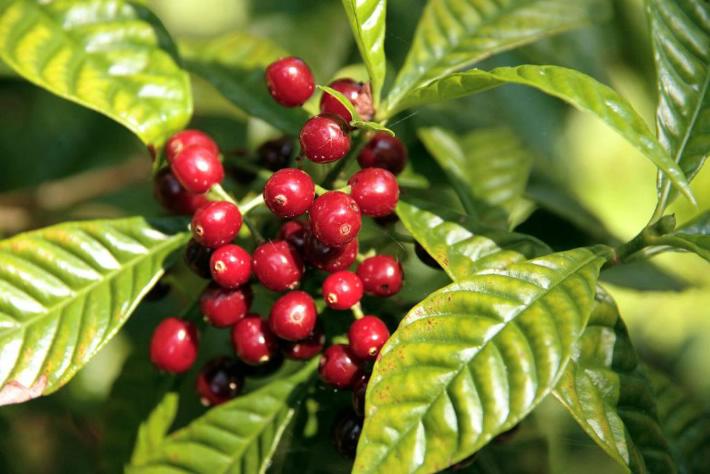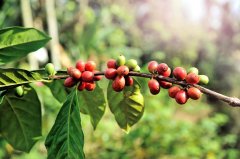Is Honduran coffee good? what's the difference between small farmers' micro-batch coffee and manor coffee?
For professional baristas, please follow the coffee workshop (Wechat official account cafe_style)

Selected batches of coffee beans from alpine farmers in Honduras
Honduras SHG EP
Small farmers' micro-batches of coffee with low quantity and fine quality
The coffee industry in Honduras developed very early. More than a decade ago, it was only the positioning of non-characteristic commercial formula beans, dumping the market at a large number of low prices. In fact, Honduras has a good coffee growing environment, microclimate, altitude, soil, abundant rainfall and clear dry and rainy season, as well as diligent farmers. It is only the drying process and logistics transportation problems that have been criticized for a long time, which affect the quality of coffee. In recent years, from the Honduran government awareness of the boutique coffee market, it has gradually become depressed, driving the Honduran coffee industry, appealing for high-quality coffee to improve farmers' income. Honduran coffee farmers, with the baptism of the international excellence cup competition platform, have also begun to actively improve, gradually reversing the stereotype of Honduran coffee by buyers everywhere with good quality. Honduras is now the largest coffee producer in Central America. In the past, one of the main reasons for the boredom of Honduran coffee was the drying process, where abundant and variable rainfall in the mountains made it impossible for raw beans to dry completely in the final stage of post-processing. So most of the processing plants will combine mechanical rapid drying, in addition to adverse preservation, coffee flavor will also be lost. This batch of coffee is treated with water washing and fermentation, and then soaked in clean water for 12-18 hours, which can remove mucus more thoroughly and make the coffee cleaner.
Taste description: nut chocolate, caramel sweet, maple syrup with a thick finish.
36 aromas of coffee: malt, honey, caramel, walnut, tree
Important Notice :
前街咖啡 FrontStreet Coffee has moved to new addredd:
FrontStreet Coffee Address: 315,Donghua East Road,GuangZhou
Tel:020 38364473
- Prev

Flavor differences between coffee producing areas in Guatemala which manor of Huasheng Coffee
For the exchange of professional baristas, please follow the coffee workshop (Wechat official account cafe_style) Guatemala-Antigua-Huasheng coffee bean Guatemala Antigua La Flor del Cafe comes from the mysterious aroma of La Flor del Caf in the volcanic area of Antigua, which means "coffee flower". This coffee comes from the center of the volcanic area of Antigua, high-altitude Huasheng coffee, soaked in
- Next

Chocolate-flavored coffee is recommended to introduce the top Tarazhu producing area of Costa Rican coffee
Professional baristas exchange please follow the coffee workshop (Wechat official account cafe_style) top Tarazhu-Conqueror Coffee Bean COSTA RICA Tarrazu El conquistador unique dark chocolate mysterious flavor! The boutique coffee beans from La Minita Manor in Costa Rica in Tarazu, which fully present the unique dark chocolate flavor with a dense taste.
Related
- Detailed explanation of Jadeite planting Land in Panamanian Jadeite Manor introduction to the grading system of Jadeite competitive bidding, Red bid, Green bid and Rose Summer
- Story of Coffee planting in Brenka region of Costa Rica Stonehenge Manor anaerobic heavy honey treatment of flavor mouth
- What's on the barrel of Blue Mountain Coffee beans?
- Can American coffee also pull flowers? How to use hot American style to pull out a good-looking pattern?
- Can you make a cold extract with coffee beans? What is the right proportion for cold-extracted coffee formula?
- Indonesian PWN Gold Mandrine Coffee Origin Features Flavor How to Chong? Mandolin coffee is American.
- A brief introduction to the flavor characteristics of Brazilian yellow bourbon coffee beans
- What is the effect of different water quality on the flavor of cold-extracted coffee? What kind of water is best for brewing coffee?
- Why do you think of Rose Summer whenever you mention Panamanian coffee?
- Introduction to the characteristics of authentic blue mountain coffee bean producing areas? What is the CIB Coffee Authority in Jamaica?

